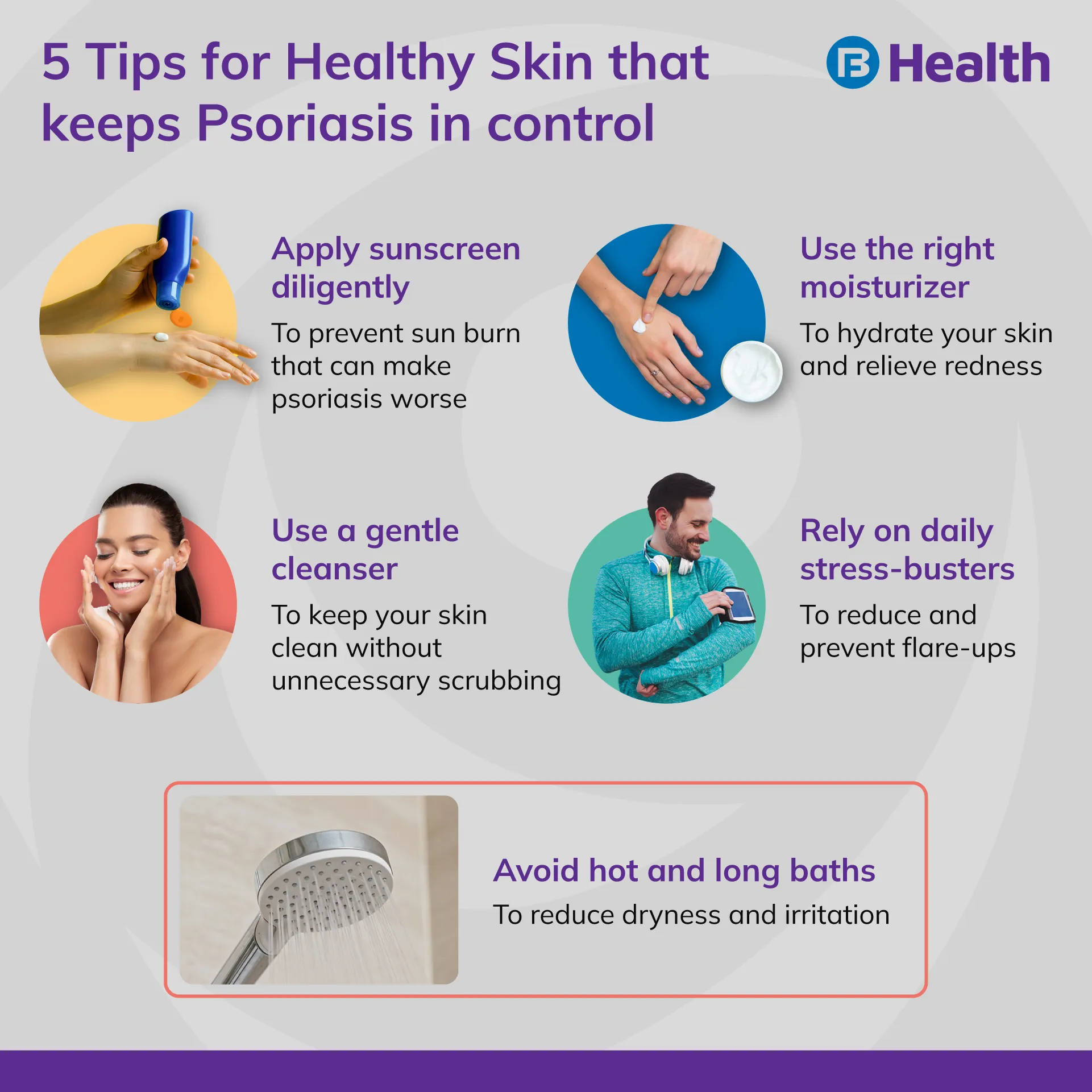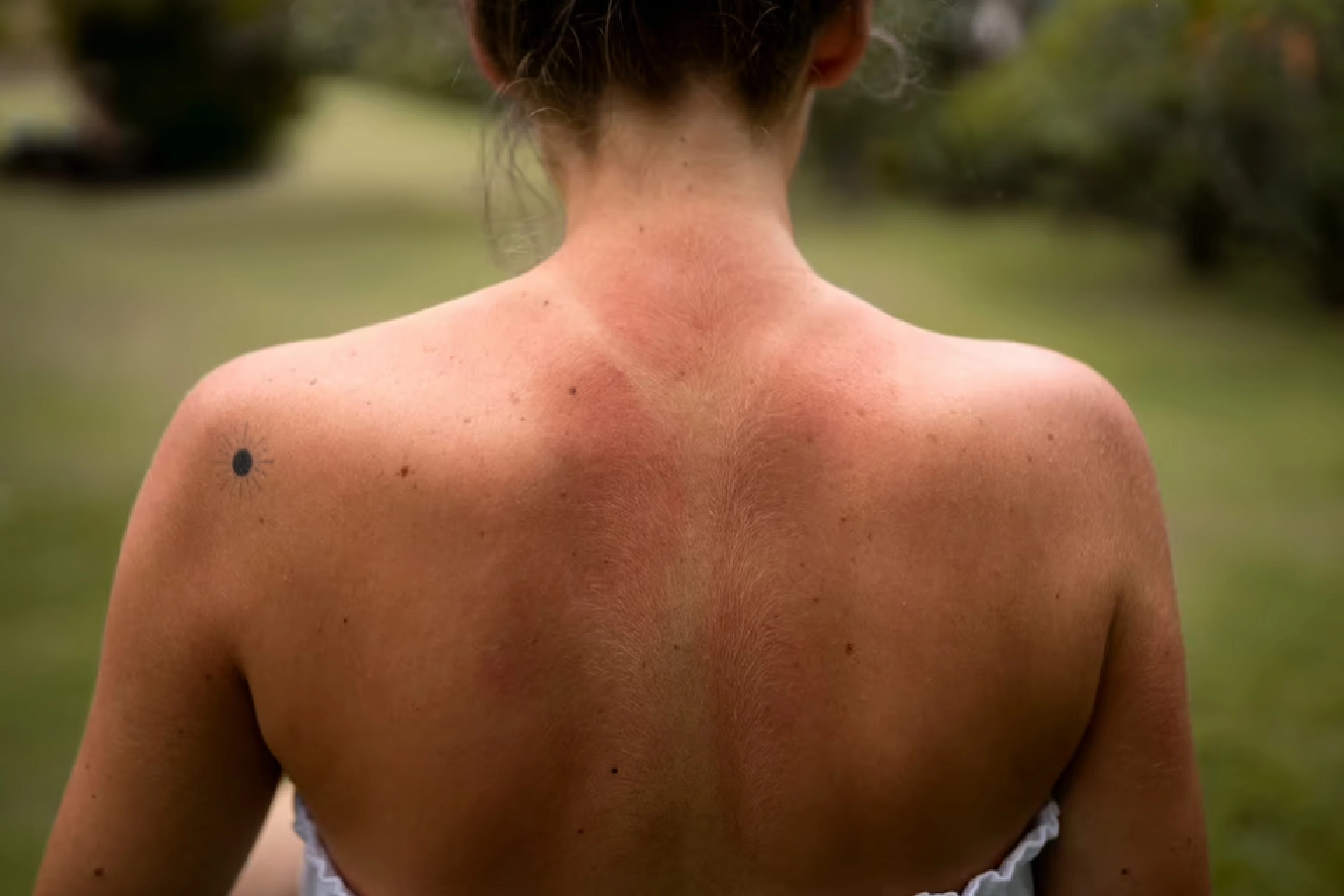Prosthodontics | 8 min read
Psoriasis: Causes, Symptoms, Types, Triggers, Medication
Medically reviewed by
Table of Content
Key Takeaways
- Psoriasis causes scaly, itchy, and dry patches on the skin, nails, or scalp
- Different psoriasis types include nail, scalp, and skin psoriasis
- You can manage psoriasis disease with medications and tips for healthy skin
Psoriasis is a skin disease that is caused by an autoimmune condition. This is where your immune system mistakenly attacks healthy skin cells. While its symptoms come and go, psoriasis is a lifelong disease that affects approximately 3% of the world’s population [1]. You may confuse diseases like psoriasis, eczema and dermatitis because of similar symptoms. With eczema, you may feel an intense itch. This is less common in psoriasis, where you may also feel a sting or burning sensation. Psoriasis causes scaly, itchy, and dry patches on the skin, nails, or scalp.
What is Psoriasis?
Psoriasis is a chronic, inflammatory skin condition that causes skin cells to turn over faster than normal. This can lead to red, scaly patches of skin that are often itchy and painful. In some cases, psoriasis can also cause joint pain.[4]
There is no cure for psoriasis, but there are treatments that can help to control the symptoms. Some people with psoriasis only have a few yearly flare-ups, while others may have the condition on a more persistent basis.
If you think you might have psoriasis, you must see a dermatologist or other medical provider get a correct diagnosis and discuss treatment options.
Different psoriasis types have slightly varied symptoms and include nail, scalp, or skin psoriasis. It is also possible that you may have more than one. The most common symptoms include red patches on the skin that are dry and itchy. They will usually get worse if you scratch the affected area. You may also experience swelling, stiffness, or pain in the joints.
Read on to know the common psoriasis types and treatments.
Types of Psoriasis
There are five different types of psoriasis, each with its own set of symptoms and treatment options.
Skin Psoriasis
Skin psoriasis is a condition that causes the skin to become red and itchy. It can also cause the skin to crack and bleed. Psoriasis is a chronic condition that can be difficult to treat. There is no cure for psoriasis, but there are treatments that can help to control the symptoms
Plaque Psoriasis
Plaque psoriasis is one the most common types of psoriasis [2]. Around 80% of people with psoriasis have this type of the disease. Its patches usually occur on:
Elbows
Knees
Lower back
They are usually about 1 to 10 centimeters wide but can be larger and cover more skin. Your doctor may prescribe ointments or medications to help manage these symptoms. In some cases, you can also try light therapies like exposure to UVB and UVA rays.
Additional read: Melanoma Skin Cancer

Guttate Psoriasis
This is usually triggered by a strep infection. It is more commonly seen in children and adolescents than adults above the age of 30 [3]. The small, red, tear-shaped spots caused by inflammation are commonly present on your arms, legs, or torso. Its treatment options also consist of light therapy and oral medication. The best treatment for your psoriasis will depend on its type and severity.
Pustular Psoriasis
Symptoms of this type of psoriasis consists of painful, white, pus-filled bumps surrounded by red or inflamed skin. These appear on your hands and feet and may sometimes cover the entire skin. The pustules may also join together and turn into scales. It is usually treated with prescribed medications and creams as well as light therapy. Treating its underlying cause may also reduce its reoccurrence.
Flexural or Inverse Psoriasis
Affecting ¼ of all patients, this psoriasis type occurs on skin folds like armpits, breasts, or genital areas. It causes severe pain and itching, worsened by sweat and skin friction. Flexural psoriasis skin is usually smooth, inflamed, red, and not scaly. The moisture from skinfolds keeps this type of psoriasis from shedding skin scales. Treatment includes steroid creams, light therapy, oral medications, or biologics.
Erythrodermic Psoriasis
This is a rare psoriasis type where your skin may look like it has a severe burn. It is a serious condition and may need immediate medical attention. You may need hospitalization if your body is not able to control the temperature. Until your symptoms show an improvement, you may be given a combination of treatments. This may include medicated wet towels, biologics, topical steroid creams, or oral medicines.
Nail Psoriasis
This is normally seen on fingernails rather than toenails. It may cause soreness and pain that may limit your mobility and impact daily activities. It can also be an indicator of psoriatic arthritis. Its most common symptoms are deformation, thickening, discoloration, or pitting. Treatment for this is the same as plaque psoriasis. It may take time for the effects of these treatments to be visible because nails grow at a slower rate.
Scalp Psoriasis
Scalp psoriasis affects more than 60% of the people affected by this skin issue. It is usually seen at the:
Hairline
Forehead
Near or inside the ears
Back of the neck
It can be itchy, painful, cause dandruff, and may result in social anxiety in some cases. Scalp psoriasis treatment includes medicated shampoos, application of vitamin D, or steroid creams. Depending on how you respond, your doctor may also include oral medication, light therapy, and biologics as a part of your treatment.
Symptoms of Psoriasis
There are many different symptoms of psoriasis, and they can vary from person to person. The most common symptoms include:[4]
- Red, scaly patches on the skin
- Itching
- Burning
- Soreness
- Inflammation
Psoriasis can also cause other problems, such as joint pain and depression. If you think you may have psoriasis, see your doctor for a diagnosis.
Is Psoriasis Contagious?
No, psoriasis is not contagious. This chronic skin condition is not caused by an infection and cannot be passed from one person to another. However, it is important to remember that psoriasis can be a very visible condition, and people with this condition may experience stigma and discrimination. If you have psoriasis, educating yourself and others about the condition is important to help reduce any negative perceptions.[4]
Additional Read: Anthrax DiseaseCauses of Psoriasis
An overactive immune system causes psoriasis. This means that the body's immune system mistakenly attacks healthy skin cells, producing too much keratin.[4]
Other possible causes of psoriasis include:
- Stress
- Hormonal changes
- Weather changes
- Skin injury
- Some medications
If you have psoriasis, you may be able to help control it by avoiding trigger factors, such as stress, and by using moisturizing creams and lotions. You may also need to take medication to control the condition.
Diagnosing of Psoriasis
If you have psoriasis, you may be wondering how your doctor will diagnose it. Doctors can diagnose psoriasis in a few different ways, and it often depends on the severity of your symptoms.
One way that doctors can diagnose psoriasis is by looking at your skin. If you have psoriasis, you will likely have thick, red skin patches with silvery scales. Your doctor may also look at your medical history and ask if you have any family history of psoriasis or other skin conditions.[4]
Another way that doctors can diagnose psoriasis is by doing a skin biopsy. This is a procedure where a small piece of skin is removed and examined under a microscope. This can help your doctor rule out other conditions and confirm a diagnosis of psoriasis.
If you think you might have psoriasis, it's important to see a doctor so they can properly diagnose and treat your condition. There are a variety of treatments available for psoriasis, and the sooner you start treatment, the better.
Psoriasis Triggers: Stress, Alcohol, and More
If you have psoriasis, it can be a frustrating and embarrassing condition. But you may not know that certain things can trigger a flare-up of your symptoms.
Stress is one of the most common triggers for psoriasis. When you're under stress, your body produces more inflammatory hormones that can cause your psoriasis to flare. That's why it's crucial to find ways to manage your stress.Drinking alcohol can also trigger a flare-up of psoriasis. That's because alcohol can interfere with how your body produces immune cells. So if you have psoriasis, you may want to limit your alcohol consumption.Other common triggers for psoriasis include infection, weather, and certain medications. Talk to your doctor if you're unsure what's triggering your flare-ups. They can help you identify your triggers and develop a plan to avoid them.Treatment For Psoriasis
There are many different treatment options for psoriasis, and the right one for you will depend on the severity of your condition and your individual preferences.
Topical treatments, such as corticosteroids, calcipotriene, and tazarotene, can be effective for mild to moderate psoriasis. Systemic treatments, such as methotrexate, cyclosporine, and acitretin, may be necessary for more severe cases.In addition to traditional medical treatments, several alternative therapies may be helpful for psoriasis. These include light therapy, fish oil supplements, and aloe vera.Talk to a doctor about all the treatment options and make a decision that is right for you.
Medication For Psoriasis
Many different medications can be used to treat psoriasis, and the best one for you depends on your symptoms' severity. Topical treatments, such as creams and ointments, are usually the first line of treatment, and they can be very effective for mild to moderate psoriasis. However, if your symptoms are more severe, you may need to use oral or injected medications. [4]No matter what type of medication you use, patience is important. It can take several weeks or even months to see results. And even if your symptoms improve, you will likely need to continue treatment to keep psoriasis from returning.Additional read: Fungal infections: How to prevent“Is psoriasis curable?” is a frequently asked question. While there is no cure available at this time, you can rely on treatment to reduce irritation, inflammation, and other symptoms. Following skincare tips recommended by your doctor can result in significant healing and in some cases, remission of this disease. It can also reduce the flare-ups you may experience.To have a better chance of beating this problem, visit your doctor at the earliest. You can book an in-person or a video appointment with the best dermatologists on Bajaj Finserv Health. This way you can get answers to questions and avail treatment for your symptoms at once.
References
- https://www.nejm.org/doi/full/
- https://www.psoriasis.org/locations-and-types/
- https://www.ncbi.nlm.nih.gov/books/
- https://www.healthline.com/health/psoriasis
Disclaimer
Please note that this article is solely meant for informational purposes and Bajaj Finserv Health Limited (“BFHL”) does not shoulder any responsibility of the views/advice/information expressed/given by the writer/reviewer/originator. This article should not be considered as a substitute for any medical advice, diagnosis or treatment. Always consult with your trusted physician/qualified healthcare professional to evaluate your medical condition. The above article has been reviewed by a qualified doctor and BFHL is not responsible for any damages for any information or services provided by any third party.





